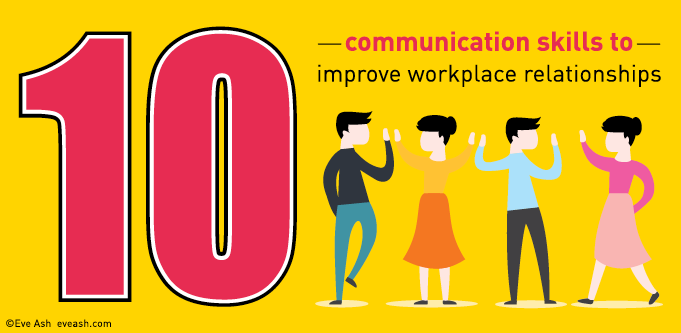
Workplaces are like families — there’ll always be those whose communication style you love and others who rub you up the wrong way.
How do you feel coming in to work? Happy to see your colleagues, looking forward to communicating with everyone? Or do some people at work feel tedious and an effort?
Open plan offices are the butt of numerous comedies for a reason: there’s the bumptious personality whose overbearing manner squashes the spontaneity in team discussions; the preoccupied boss who blithely leaves the real job of managing to others; the egotistical unit head whose default phrase is “I don’t care / I couldn’t give a …..”
We all need to make an effort, by adopting some or all of the following strategies to raise the bar with colleagues and clients.
1. Ask questions
Small talk gets most of us through the work week, but isn’t a genuine conversation where a person shows real interest so much more worthwhile? No-one’s expecting you to be Oprah, but the opportunity to talk can really make a person’s day.
Asking great questions is a fabulous way to engage with people. Some appreciate direct, business-like questions, while others respond to open questions, preferring to unwind and discuss —allowing them to be creative, to imagine and explore scenarios. Don’t sit there glancing at your watch with a fixed smile pasted on your face. That just tells the other person you’re only interested in ticking communication boxes.
2. Keep focus and summarise subtly and logically through conversations
Don’t be tempted to overdo this, as not everyone appreciates being “summarised”; you risk being characterised as the team bobcat. This technique is more called for in meetings or when the group is working on an urgent project where it is essential to allow for different communication styles.
3. Outline a plan
Be specific, not too general, and invite comment. Ask for advice or suggestions but depending on your position title and responsibilities, be careful with your timing and how you allocate carriage of responsibilities.
If you’re still new to the place and perceive what needs to be done, wait a little and study the office climate. A friend of mine was bursting to fix up numerous team snafus soon after she’d joined an organisation, but her dazzling demonstration at the first team workshop left her colleagues resentful.
4. Follow up with people
When people tell you what is important, what they are awaiting, what is about to happen, what is a problem — follow up. How did it go? Are you okay after …? Do you want to discuss the latest? What happened when…? Consider choosing a walking meeting to have this discussion, or chat over a coffee nearby. Many don’t feel comfortable discussing private matters in the office.
5. Respect other people’s privacy and space
Spend time talking with your colleagues. You’ll also get a good idea of their interests and preferences by seeing what they keep on their desks (photos, sayings, books, etc). Know what makes a person tick/happy in workplace relationships. If you’re in a position to effect change, make sure other team members aren’t riding roughshod over them in their quest to meet targets.
6. Positive body language and tone
Some confuse enthusiasm with behaving like a children’s television show host. There’s no need to pogo into the office, or tell everyone just how awesome your daily habits are. A twinkle in the eye or a commiserating tone does the trick just as well. Smile at people, spontaneously and genuinely where possible.
7. Informal, friendly language
Don’t be too formal, but don’t be too informal. Swearing, casually-expressed prejudice or copious slang tells other people that your verbal hygiene is as bad as those grots who refuse to keep office toilets tidy.
8. Know people’s interests
As someone once cheerfully remarked, “if it was fun, you wouldn’t call it a job”. People are much more than their role descriptions. Where and when you can, make time to chat over lunch and learn about what their qualifications, interests, family backgrounds and hobbies are. Remember what is important to them.
9. Know which communication approach they favour
Does this person prefer phone calls, visits, emails or texts? And when, what times are best? Know when and how best to communicate. Facebook is not the way most people want to communicate! Friends and colleagues get busy. Some respond to texts, others like to write or receive a nice long email, and some prefer face-to-face catchups. Each are equally valid, but monitor what you put in writing — things can come back to bite.
10. Help them if they are struggling
Make an offer and commit the time to that person. Constructive, problem-solving concern will communicate volumes.
Above all, see if you can go one better: make the above steps your company’s approach to dealing with the public, both in person and online.


COMMENTS
SmartCompany is committed to hosting lively discussions. Help us keep the conversation useful, interesting and welcoming. We aim to publish comments quickly in the interest of promoting robust conversation, but we’re a small team and we deploy filters to protect against legal risk. Occasionally your comment may be held up while it is being reviewed, but we’re working as fast as we can to keep the conversation rolling.
The SmartCompany comment section is members-only content. Please subscribe to leave a comment.
The SmartCompany comment section is members-only content. Please login to leave a comment.